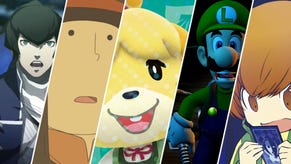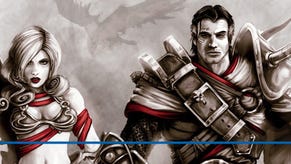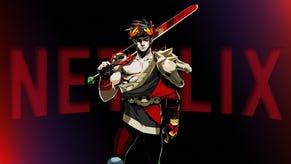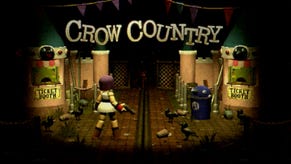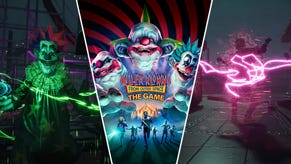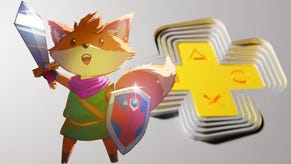What Bravely Default Gets Right
There's more than just Final Fantasy nostalgia at work in Square's extraordinary new 3DS RPG.
This article first appeared on USgamer, a partner publication of VG247. Some content, such as this article, has been migrated to VG247 for posterity after USgamer's closure - but it has not been edited or further vetted by the VG247 team.
While we're waiting for Bravely Default to make its U.S. debut, we can continue to savor the great irony of the game: Square Enix finally managed to create an RPG that's won the hearts of old-school Final Fantasy fans by completely cutting loose the Final Fantasy name and doing their own thing.
Still, Bravely Default offers much more to recommend the game than simply the way it taps into a sort of primal nostalgia for Final Fantasy IX. It absolutely does recapture the essence of 16-and 32-bit Final Fantasy, but to present that one facet of the game as its highlight does the whole thing a disservice. What impresses me most about the game is in Bravely Default someone at long last has cracked the code on how to integrate multiplayer and social mechanics into a single-player RPG without compromising the whole thing.
Pete Davison has already touched on how deftly Bravely Default makes use of these features as well as the dreaded microtransactions, but I feel compelled to add my voice to the chorus of praise. The idea of just what to do about the growing importance of multiplayer gaming in a genre as staunchly focused on solo play as the traditional RPG has existed since long before the advent of 3DS's Street Pass.

In fact, you can find prototypical attempts as far back as 1987's Nethack (well before true online multiplayer RPGs even existed), which took advantage of the game's server-based nature to create "bones files" that marked the spots in which previous players on the current mainframe had fallen -- a direct precursor to corpse-looting in true MMOs. Console RPGs and action RPGs such Swords & Serpents, Secret of Mana, and even Final Fantasy VI tried to make the RPG work for multiple players as well, with varying results; later, CyberConnect2 went to insane lengths to simulate a fake MMO for single players with the .hack series.
Bravely Default's mechanics, however, have their deepest roots in games of a much more recent vintage: Square Enix's own DS masterpieces The World Ends With You and Dragon Quest IX. While both predated 3DS and Street Pass -- and in fact their popularity played an instrumental role in Nintendo making Street Pass an integral part of the system -- they attempted to use the DS's passive wireless to add a social component to their decidedly single-player journeys. In The World Ends With You, swapping data with other players would help their pins (special attacks) level up. Not only that, but the game offered extra experience points when you put the game into sleep mode for a day or two -- a precursor of sorts to the free-to-play "recharge" model, but one that worked entirely to player's benefits rather than being wielded as a bludgeon to extort them for microtransaction cash.
Dragon Quest IX, on the other hand, incorporated an even richer social component. For starters, it actually allowed up to four players to go out and adventure together despite the presence of traditional, turn-based combat; in fact, the player's secondary party members were treated as interchangeable generics to allow friends to drop in and out relatively seamlessly.
In the nearly three years since the 3DS debuted, no game has managed to surpass what Dragon Quest IX offered. No game besides Bravely Default
The social feature that really set DQIX over the top, however, was its pre-Street Pass connectivity, which allowed people to send their protagonist to other DQIX players' games, passing along treasure maps that revealed hidden dungeons. A few quirks of the game's dungeon-generation mechanics resulted in a handful of infamous maps that could be manipulated to crack the game wide open. DQIX was bound to succeed based on its legacy and the popularity of the DS alone, but the passive socialization (and the perks it entailed) turned a sure hit into an absolute juggernaut.
Yet both games' social elements came with drawbacks as well. DQIX in particular really made players jump through hoops in order to tag friends, forcing them to return to a town near the beginning of the game, talk to a certain NPC to put the game into communication mode, and clear their queue every time they hit the three-visitor limit. Much of this came from the fact that the games were exploiting a hardware feature in need of more baking time. The 3DS offers fuller support for sleep mode communication, but in the nearly three years since the system's debut no game has really managed to surpass what DQIX offered. No game besides Bravely Default, that is.
Bravely Default makes use of Street Pass in several ways -- and its multiplayer functionality isn't limited entirely to Street Pass, which should come as a tremendous relief to everyone who doesn't live in central Tokyo or spend their weekends at game and anime conventions. At the most basic level, people you interact with (whether via Street Pass, your 3DS Friends List, or by random daily online lottery) will become residents of the in-game village of Norende, aiding in its reconstruction by rebuilding shops and clearing new areas while the game is active (either being played or in sleep mode). However, these residents also become comrades in arms, allowing you to summon them in battle (but only once) to help bluster your way through a particularly challenging encounter.

The social component of Bravely Default has the potential to break the game's balance. If you manage to end up with a friend's summon from much further into the quest than you've currently reached, you can potentially defeat a difficult boss with a single move; summoned friends actually break the damage limit imposed on normal attacks, and it's even theoretically possible to summon a comrade with hundreds, perhaps thousands of times your current party's power. Not only that, but summoned abilities have the potential to incorporate "undocumented" features custom-added onto standard skills by their user, making these special powers even more valuable than for their raw attack power.
Reconstructing Norende offers the same potential, albeit on a more limited scale. If you rebuild a weapon or armor shop to its max level, you can technically gain access to endgame-caliber equipment as early as the prologue. I had the opportunity to buy top-level gear before even fighting the first boss of the first chapter of the story, equipment roughly 10 times as powerful as the gear that would normally be available by that point in the story. Furthermore, the Sleep Point feature allows players to interrupt combat at any point to execute special commands.
Bravely Default's finely balanced mutability may be the holy grail of single-player RPGs: A great solo experience made even better by optional social features that never feel intrusive or nagging
So what's to keep Bravely Default from being rendered completely toothless by all these meta-game mechanics? Surprisingly, they don't completely destroy game balance; Bravely Default is smartly designed enough to allow for their presence without completely falling apart.
Take the Norende shops, for example. Yes, you can unlock weapons powerful enough to keep you going into the later chapters of the game almost from the start -- but there's no way you can afford to buy them that early. Norende's top-level sword would take a level-10 knight's attack power rating from 30 to 180, but at 99,999 gold it costs about 10 times what a level-10 knight will have seen over the course of his entire adventure. Grinding up enough cash to buy the thing before advancing the story would bring your party's levels up so high that the game wouldn't be a challenge for the near-term future anyway.
As for the summons, those are naturally self-limiting; you can only summon a friend once, after which their ability is no longer available. Only by "recording," sending, and uploading their attack choice in combat will they become available again. So unless you have active friends or encounter a remarkable number of high-level strangers, these powers become, effectively, an emergency resource, something you can only afford to use in moments of desperation. It also encourages reciprocal action, sending out updated attacks of your own on a regular basis, giving your friends (and passing strangers) a steady supply of ever-more-powerful attacks through your active participation.

And most importantly of all, while none of these features break the game, neither are they necessary to victory. By all accounts, you can play Bravely Default from start to finish without ever activating Street Pass or going online. Of course, the game encourages you do so; in lieu of overt tutorials, it presents new tasks and mechanics as optional challenges, rewarding you with small perks for performing them for the first time. But it's entirely possible to take a totally antisocial approach to Bravely Default and play through it as a standard single-player RPG. Either way is perfectly valid.
Bravely Default's finely balanced mutability may be the holy grail of single-player RPGs: A great solo experience made even better by optional social features that never feel intrusive or nagging. This balance simply becomes an extension of the malleability that Mike pointed out in our review of the game. As you can adjust the encounter rate or the difficulty level, so too can you elect to invest in Norende's reconstruction; so too can you invest in high-level powers; so too can you call powerful friends into battle. Bravely Default can pose as much or as little of a challenge as you'd like.
In the end, this amounts to a perfect extension of the underlying ethos of the game: Player discretion as derived from the classic Final Fantasy Job system. Bravely Default presents you with no end of tactical possibilities to meet the challenges you encounter. You can create a balanced team or pour all your resources into minmaxing a single character. You can buy gear slightly ahead of the curve thanks to Norende or steal your entire stock of items en route. You can play it however you like, literally.

For me, the pieces fell into place in the midst of a chapter one sidequest in which I ended up going toe-to-toe with a pair of enemies that probably should have been slightly too difficult for my fledgeling party to handle. One of the enemies had a nasty habit of taking double consecutive turns in which he used an attack that hit a single character for more than half the target's max hit points -- a fixed-value attack that ignored defense and couldn't be mitigated by better armor, protective spells, or defending by "defaulting."
But despite being overmatched, several options presented themselves; I could have bought HP-boosting gear to raise my party members' max health. I could have been boring and grinded for levels. I could have sunk all my cash into a couple pieces of overpowered Norende gear. I could have summoned a few friends. And even at that early point in the game, the Jobs that had opened up to me afforded a number of ways to deal with the threat, such as equipping every character with the passive trait that causes damage to be spread across the entire party, ensuring even if the enemies focused on a single party member they wouldn't be able to take him or her out in a single turn.
Everyone looks for different things in RPGs, but to me the essence of a great role-playing game is in a constant push-and-pull of factors: New and creative challenges, interesting player choices, and limited resources to force you to make hard decisions. Bravely Default features all of these elements in spades, and its social features enrich rather than diminish them. While I've heard mixed things about the game as a whole, in the early going, at least, it manages to strike a perfect balance of design elements -- including its inventive social hooks. If there's any goodness in this world, we'll be seeing many more games that work like this.

